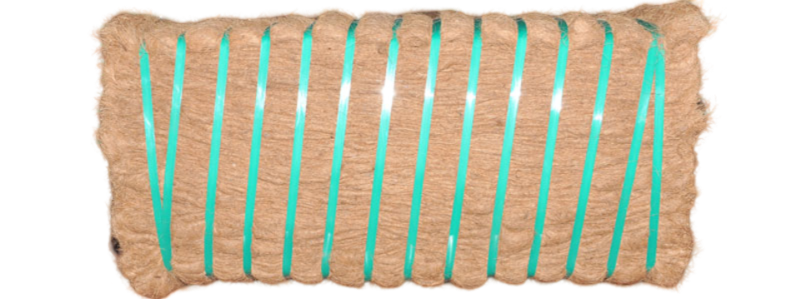Description
120kg Coco Fiber Bale is a highly compressed bundle of coir fibers, derived from the outer husk of coconuts. Coco fiber bales are durable, versatile, and widely used in horticulture, erosion control, mattress manufacturing, and as an eco-friendly material in various industries. Coco fiber is valued for its tensile strength, biodegradability, and aeration properties, making it an ideal substrate in growing mediums or a base material for products requiring natural, resilient fibers.
1. What is a 120kg Coco Fiber Bale?
- Definition: A 120kg coco fiber bale is a large, densely compressed block of long coconut fibers, often sourced directly from the husk. The bale’s high compression enables it to be transported and stored efficiently, providing a significant volume of coir fiber once unpacked.
- Purpose: Used in applications ranging from soil improvement to erosion control, horticulture, and manufacturing. It is an ideal material for industries that require sustainable, natural fibers with strong structural properties.
2. Composition and Characteristics
- Coconut Fiber: Long, durable fibers derived from the husk of coconuts. These fibers are naturally resistant to decay and have high tensile strength.
- Moisture Content: Typically around 10–15%, which preserves the fiber’s integrity and prevents mold growth.
- pH Range: Generally neutral to slightly acidic, around 5–6.5, suitable for most plant-related applications.
- Fiber Length: Ranges from 10–30 cm, with some customization available depending on the intended use.
- Density: Highly compressed to 120 kg for transport; expands significantly when loosened.
3. Physical Specifications
- Bale Size and Weight: 120 kg, commonly compressed to a compact block for efficient handling.
- Compression Ratio: Often compressed in a 4:1 or 5:1 ratio, maximizing storage and transport capacity.
- Volume After Expansion: Once loosened, the bale yields a significant amount of fiber, often expanding to fill multiple cubic meters.
4. Advantages of 120kg Coco Fiber Bale
- Eco-Friendly and Biodegradable: Coco fiber is an organic, renewable material that decomposes naturally, enriching the soil over time.
- Strong and Durable: Known for its high tensile strength, coconut fiber withstands tension and is resilient against wear.
- Aeration and Drainage: Adds structure and promotes aeration in soil mixes, helping prevent soil compaction and supporting root health.
- Versatile Applications: Can be used in various industries, from horticulture and agriculture to erosion control and industrial manufacturing.
- Natural Resistance to Decay: Coco fiber has natural antifungal properties, making it durable even in wet or humid environments.
5. Applications of 120kg Coco Fiber Bale
- Horticulture and Agriculture: Used as a soil amendment to improve aeration and drainage in growing mediums, especially for crops like tomatoes, orchids, and other root-sensitive plants.
- Erosion Control: Ideal for erosion blankets, coir mats, and netting on slopes, riversides, or embankments to prevent soil erosion.
- Hydroponics: Provides structure and aeration in soilless growing systems.
- Manufacturing: Utilized in eco-friendly products like biodegradable pots, mattresses, brushes, ropes, and mats.
- Composting: Coco fiber can be used as a carbon source in compost piles, aiding decomposition and enhancing soil amendment materials.
6. How to Use 120kg Coco Fiber Bales
- Unpack and Loosen: Due to high compression, the bale should be unpacked and loosened before use.
- Hydrate if Needed: For horticultural uses, soaking the fibers in water can improve flexibility and make them easier to mix with other substrates.
- Mix with Other Growing Mediums: Coco fiber can be combined with cocopeat, soil, or other materials to enhance soil structure.
- Apply in Erosion Control: For erosion control, the fiber can be laid out on slopes or used in coir logs or mats for stabilization.
7. Customization Options
- Fiber Length: Customizable fiber lengths depending on the intended use, with shorter fibers for horticulture and longer fibers for erosion control and manufacturing.
- Pre-Treatment: Some fibers can be pre-treated to reduce natural salt content, which is important for sensitive crops.
- Bale Size: While 120 kg is standard, different weights and compressions are available depending on user needs.
8. Environmental Benefits
- Sustainable: Coconut fiber is a by-product of coconut processing, making it an eco-friendly material that reduces waste and reliance on synthetic alternatives.
- Biodegradability: Coco fiber decomposes over time, adding organic matter to the soil, which is beneficial for long-term soil health.
- Reduces Soil Erosion: Coco fiber bales can help control erosion, aiding in sustainable land management and environmental protection.
9. Storage and Shelf Life
- Storage: Store in a dry, cool place to prevent premature degradation or mold growth.
- Shelf Life: Coco fiber bales can be stored for extended periods if kept dry and well-protected from moisture.
Specifications
- Bale Size :48″ x 24″ x 24″ inch’s
- Weight (Bale) :120 to 130 Kg
- Fiber Length :7 – 10cm 20%, 10-22cm 80%
- Moisture Upto :15%
- Colour :Brown /white
- Impurities Upto :< 5%
- Load ability :200Bales / 24 MT in one 40’ HC container
- Type of loading: Free Loading










Reviews
There are no reviews yet.